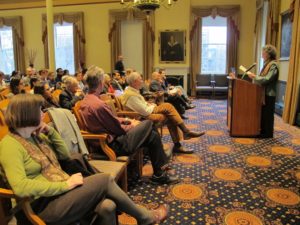Development and Equity
The Global Development and Environment Institute (GDAE) at Tufts hosted their annual award ceremony for the Leontief Prize in Ballou Hall last week. The event was sponsored by the Tufts Institute for the Environment and the Tufts Program in Women’s, Gender, and Sexuality Studies. The prize, named after Wassily Leontief, is awarded for advancing the frontiers of economic thought and supporting just and sustainable societies. The prize, given out since 2000, has been awarded to 32 distinguished economists over the years, including Amartya Sen (Nobel Prize winner for welfare economics), John Kenneth Galbraith (market power and consumer sovereignty) and Herman E. Daly (Beyond Growth: The Economics of Sustainable Development).
Diane Elson, emeritus professor at the University of Essex, spoke about her research on development through a gender lens. She prefaced her talk with the following quote, “Standard macroeconomic policy is not gender neutral. It emphasizes the expansion of market activity and devalues non-market activity. Development measures should be adjusted to account for this.” Elson quoted numbers from research on gender and non-market activity. A man in Buenos Aires spends an average of 89 minutes per day on unpaid work, while a woman spends 256 minutes per day. Adding paid work, men average 422 minutes per day and women 436 minutes per day. In India the numbers for men and women are 36 and 354, respectively. These numbers also show the magnified effect of this disparity in paid/unpaid work distribution in relatively less developed countries. By Elson’s estimates, putting a monetary value (even just minimum wage) on unpaid work would inflate GDPs by 20-40%. She suggests a system to remedy this siguation: Recognize, Reduce, and Redistribute. Recognize unpaid work by incorporating it into GDP. Reduce the imbalance by improving, for example, water infrastructure, which women in developing countries spend disproportionate time and energy gathering. Finally, redistribute unpaid work by offering parental leave for new fathers in addition to new mothers.
Amit Bhaduri’s lecture focused on issues of power in economics. He says that current economic curricula teach the subject as “Adam Smith minus Karl Marx.” Bhaduri’s work has covered many fields, but his driving force is the question of how people relate to and dominate one another. He calls into question the ideas of the “mutual dependence” of labor and capital (or his other example, the lion and rabbit) and “market equilibrium” in an efficient market He stressed the necessity of equality in order to achieve true mutual dependence, otherwise the mutual nature of the relationship falls apart. There are few cases in which market equilibrium is achieved. Standard economic theory requires that all firms in a market are in perfect competition, and therefore must accept the going rate for selling their goods and services. It is more likely that firms, often using misinformation campaigns, act more as price-setters than price-takers. Bhaduri also spoke on the history of banking regulation in the United States and development and growth strategies in India.
A video recording of the event will be released shortly, found here.


